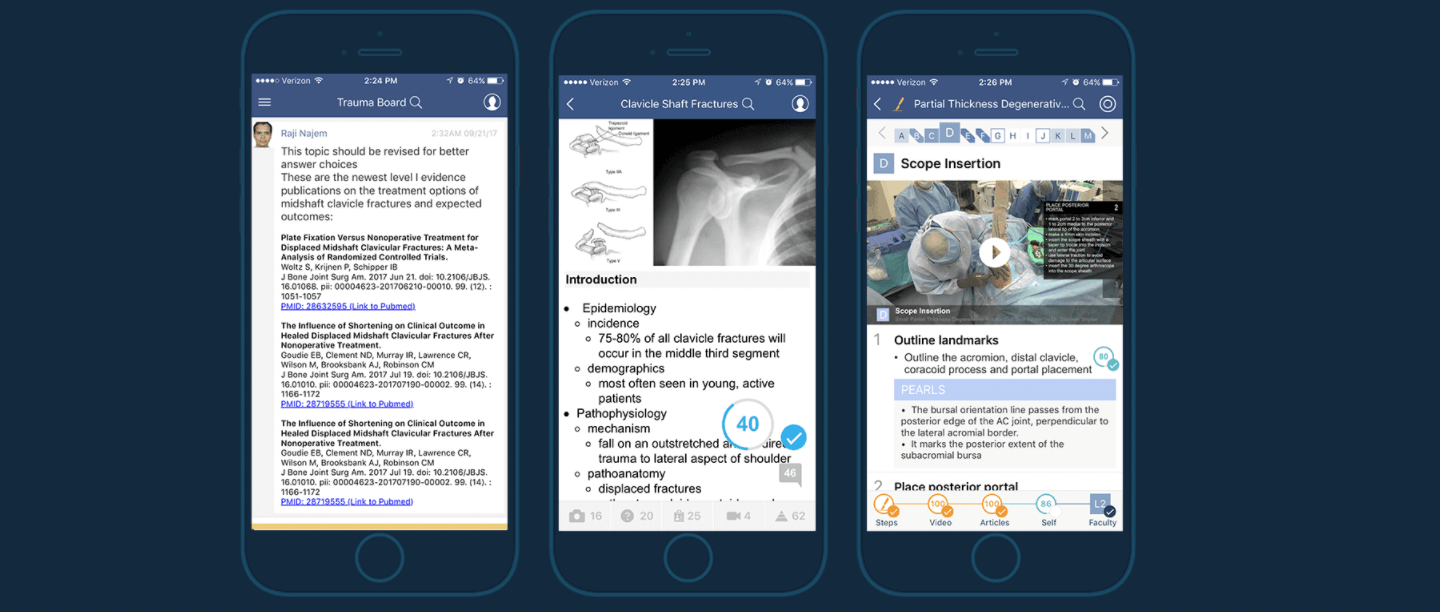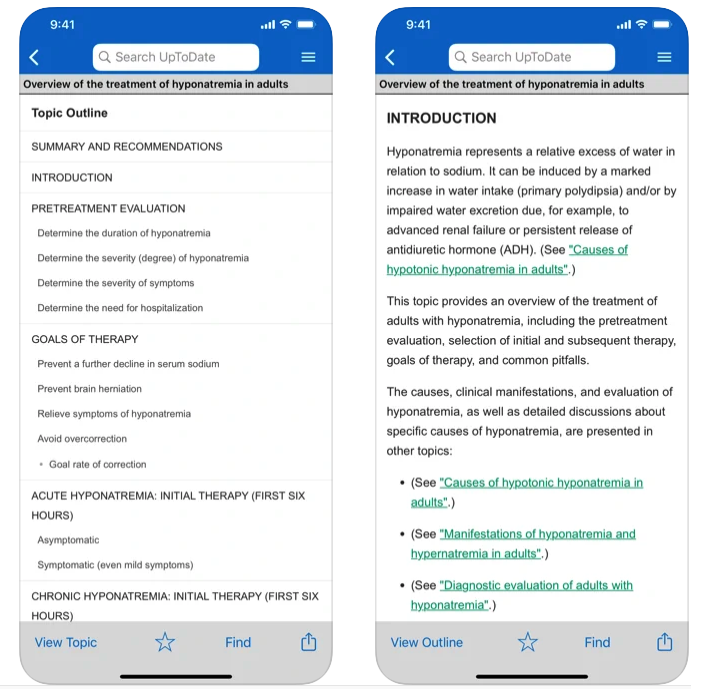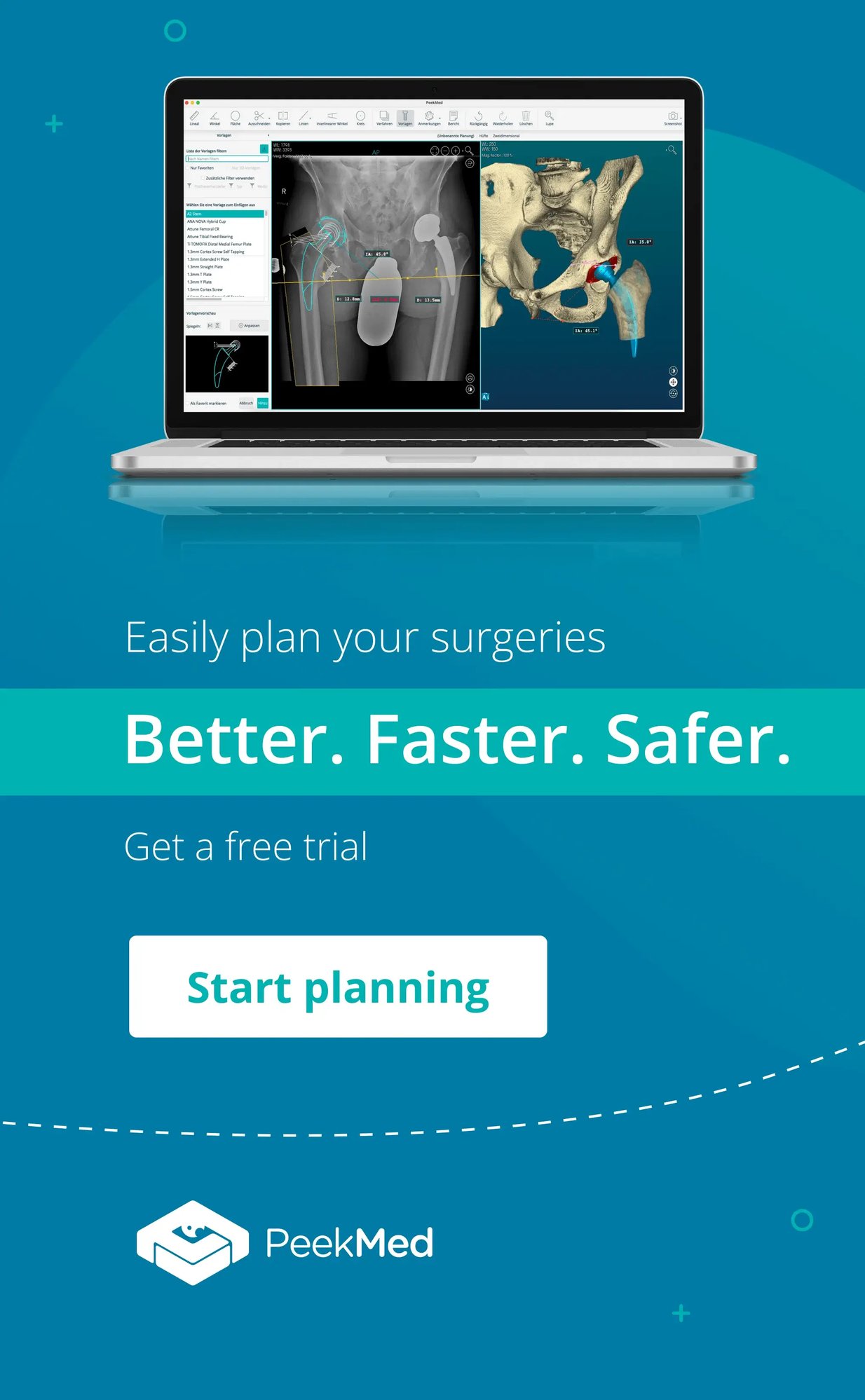PeekMed
The best apps for orthopedics are a key component of the digital healthcare transformation.
These mobile applications, or apps, enhance various aspects of medical practice, from primary care to surgery. Orthopedic apps provide surgeons with tools that significantly improve clinical outcomes and streamline workflows.
However, many surgeons still don’t use new orthopedic technology solutions. This is mainly because they either are not aware of what medical apps for ortho can offer or that they even exist.
In this article, we will discuss what benefits the best apps for surgery will bring you, but we’ll be covering topics such as:
Apps for orthopedics: Who uses and what for?
Research1 shows that over 64% of orthopedic doctors are using mobile apps in everyday clinical practice and that nearly 100% have a smartphone. This suggests that the rate of mobile medical apps will only increase.
Over 90% of the inquired doctors perceive medical apps as beneficial and having a promising future, according to the same study led by Dr. Florian Dittrich.
These findings had already been suggested by an earlier study conducted by Dr. Frank and colleagues. On that subject, when asked about the best mobile orthopedic app categories, the answers2 were as follows:
-
Technique Guides (35%)
-
Coding and Billing (34%)
-
Textbooks/Reference (32%)
-
Orthopedic In-Training Exam (28%)
-
Classification/ Treatment (27%)
Medical apps: Why you should use them?
The adoption of new (orthopedic) technologies – or digital health as a whole – is not always spontaneous.
Resistance to innovation is a well-known field across research. This includes mobile applications in medicine.
But why do healthcare professionals avoid innovation? According to the World Health Organization3, when it comes to medical devices, the resistance to innovation is often related to:
-
Innovation includes adaptation. Often it might include improvements to an existing product or solution. This leads the healthcare practitioner to get out of his comfort zone.
-
Innovation does not happen logically. It’s a combination of social, economic, historical, and institutional factors. Sometimes you might not be aware of the quick win it might bring to you and thus reject it.
-
Lack of Marketing and Communication to promote a said solution to new doctors. For instance, this creates a gap in knowledge between doctors and the new orthopedic technology.
Overall, innovation requires the interaction of three main factors: The attributes of the solution, the context where it is inserted, and the interaction between them.
However, innovation benefits society, and the integration of Big Data in Healthcare is a prime example. Thus, the adoption of healthcare innovations leads to:
-
Better healthcare outcomes and insights. Thus, allowing patients access to better diagnosis, while needing less effort from the physician.
-
Personalization of treatments to each patient. For instance, how 3D Printing allows patient-specific instrumentation and robotic surgery.
-
Economy scales and efficiency gains, leading to more sustainable healthcare institutions.
Now, if you are sold on the benefits of apps for orthopedics, allow us to make some suggestions.
3 Best apps for orthopedic surgeons
PeekMed - An app for orthopedic surgery
PeekMed has been referred to as one of the best apps for orthopedic surgery, as it has its ortho app for iPad. PeekMed is categorized as a medical device that integrates both a medical app and a system.
Through innovative medical technology, PeekMed allows orthopedic surgeons to bring the power of artificial intelligence surgical planning to the OR on their mobile devices.
Thus the surgeon has access to images and videos in real time, making orthopedic surgeries faster and safer.
While this is a great preoperative planning tool for the surgeon, helping implement patient-specific approaches, it also provides good outcomes for patient education. A study4 suggests that the use of tablet computers in the examining room is perceived positively by most patients.
You can try the PeekMed system for 30 days for free and the app is available at the iPad App Store.
Bullets: Learn in the Community
Bullets App is the partner for orthobullets.com and Medbullts.com. If you are not familiar with the platforms, its goal is to promote continued education.
This integrated community allows orthopedics surgeons – and other physicians – to collaborate and learn.
How it works is that the orthopedic surgeon selects a topic of interest – for instance, joint replacement – for which the app presents a detailed subsection.
With an easy-to-use design, through this app orthopedic surgeons can access cases, videos, and techniques walkthroughs.

Images and full-text resources are very well organized, allowing the user to have an integrated experience compared to the website.
Bullets also allows users to take special tests (self-assessment exams) and contribute to them by posting educational comments with scientific references.
UpToDate - taking the best medical decisions
UpToDate is one of the best apps for orthopedic residents and students who want to keep up to date. When we talk about innovation, we’ve to be aware that it can happen in clinical development too.
The healthcare app's main goal is to help professionals make appropriate care decisions based on evidence. UpToDate allows physicians to access guidelines and expert-based consensus treatments.

Within the palm of your hand, you can easily search and learn about the latest updates on dosings, interactions, side effects, etc.
While this is an excellent resource across any doctor's career, it has been frequently pointed out as a perfect tool for medical students.
While these apps are especially focused on orthopedics practice, there are other healthcare apps for doctors that can also be useful for your clinical practice.
References
1 - Dittrich, F., Back, D. A., Harren, A. K., Landgraeber, S., Reinecke, F., Serong, S., & Beck, S. (2020). Smartphone and App Usage in Orthopedics and Trauma Surgery: Survey Study of Physicians Regarding Acceptance, Risks, and Future Prospects in Germany. JMIR Formative Research.
2 - Franko, O. I., Andrawis, J. P., & Mickelson, D. T. (2015). Mobile apps for orthopedic surgeons: how useful are they?. Orthopedic Research and Reviews.
3 - World Health Organization. (2010). Barriers to innovation in the field of medical devices (No. WHO/HSS/EHT/DIM/10.6). World Health Organization.
4 - Strayer, S. M., Semler, M. W., Kington, M. L., & Tanabe, K. O. (2010). Patient attitudes toward physician use of tablet computers in the exam room. Family Medicine.




